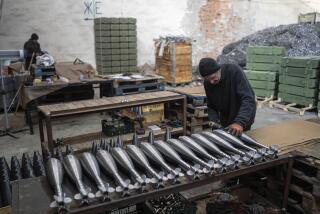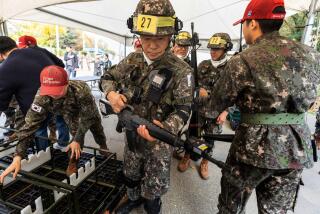Defense Cuts Wreak Hardship on a Soviet Navy Town : Military: In the Pacific fleet’s home port, unemployment climbs. Business and industry also feel the pinch.
- Share via
VLADIVOSTOK, Soviet Union — For 10 years, Sergei Kushpetovsky loyally served the Motherland, rising to the rank of captain in the Soviet army. Then eight months ago, the unthinkable happened--the Motherland fired him.
“I gave everything I had to the country and got nothing back,” Kushpetovsky said. “I have a family to support, and they didn’t give me a kopeck to live on.”
Like thousands of others, Kushpetovsky was a victim of the sharp cut in defense spending that has forced the Soviet Union to slash the size of its armed forces. Last week, President Mikhail S. Gorbachev announced a further reduction of 700,000 from Soviet forces, taking them down to 3 million.
While such cuts are extremely popular abroad, the same cannot be said in the Soviet Union, especially in cities such as Vladivostok, the home port of the country’s Pacific fleet. As in such American naval towns as San Diego and Norfolk, Va., the military presence in Vladivostok means incomes not only for service personnel but also for the vast industries that support them.
The military presence in Vladivostok--a city that, with its hills and trolley cars, resembles San Francisco--is visible on every street corner, with sailors and soldiers window-shopping or dashing into enormous, marble military buildings and clubs especially for servicemen. The military presence is so vast that the city has been closed to foreigners since World War II, a decision reversed by Russian Federation President Boris N. Yeltsin only two weeks ago.
“If you are 40 years old and have been a soldier all your life, there are not many places you can find work,” said Alexander Brekhov, a former Soviet officer who was demobilized a year and a half ago. With the economy collapsing, few factories are hiring workers.
Brekhov said that, while the military tried to use the spending cuts to eliminate poorer-quality officers or malcontents and alcoholics, inevitably a lot of talented people got thrown out as well. Never regarded as a glamorous job, military service was at least thought of as lifetime employment.
Brekhov attended business school after leaving the army and seven months ago set up a shop in Vladivostok staffed entirely by former military officers.
The officers are all college-educated, know teamwork and enjoy military discipline, Brekhov said on a guided tour of his Perspective Shop, where goods are sold at free-market prices.
Brekhov said that he has 25 applications for every job, a sign that many military men are without work. He pays the men 500 rubles a month, about $300 at the commercial rate of exchange, plus a bonus based on sales.
Most Soviet soldiers who leave the military with less than 20 years’ service get no pension when they are released.
The shock of such a loss is amplified by the fact that most servicemen also lose free housing on army and naval bases, which is almost impossible to replace, and stop receiving the special military allotment of meat and food not available in civilian shops. A Soviet army captain receives about 300 rubles a month, roughly the average Soviet industrial worker’s pay.
“It’s officially acknowledged that all Soviet military officers live below the poverty line,” Brekhov said.
Vladivostok, a city of 600,000, and the surrounding region are also starting to feel the pinch of reduced government spending on the vast military-industrial complex.
“The Far East has always been a strong military fist, with the naval presence, missiles and army bases,” said Alexander Radushkevich, editor of a new business newspaper here. “Virtually all business is connected with the military, and it’s very difficult to transfer to some other kind of production.”
The factories have become accustomed to receiving money from Moscow without trying to figure out whether they make a profit, the kind of expertise deemed critical for economic survival as the country moves to a free market.
Radushkevich said that while factories have not begun layoffs yet, the government has sharply cut production of weapons, meaning that factories are receiving greatly reduced income. Many technical people have quit their state jobs and have joined cooperative businesses that pay higher, free-market salaries to build microwave ovens and computers.
Workers in the Soviet military-industrial complex had always been given special status, including the finest equipment and highest salaries. It will be difficult to find similar jobs for them in the future.
At one industrial complex called the Star Factory in Bolshoi Kamen, about 100 miles from Vladivostok, clashes have been reported between management and workers, because members of the blue-collar staff are opposed to converting the factory to civilian production.
“The region has a very large military industry,” said Pavel A. Minaker, director of the Far East division of the Soviet Union’s Institute of Economic Research. “We need to switch to a commercial basis for a productive industry, but the social result can be very unpleasant, as we simply do not have enough money.”
More to Read
Sign up for Essential California
The most important California stories and recommendations in your inbox every morning.
You may occasionally receive promotional content from the Los Angeles Times.












